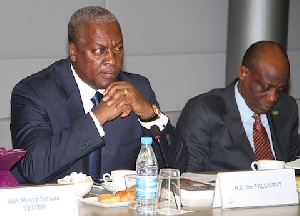Ghana’s petroleum revenues earned for the year 2014 were not maximized and utilized effectively; the Public Interest and Accountability Committee (PIAC) has said in its report.
The committee, which is mandated by law to oversee the management of petroleum revenues, maintained that revenues accruing to the sector were spread too thinly over a wide range of projects, diluting its impact, instead of being utilized on only a select few.
The concerns which were aired at the launch of the report in Accra last week, noted for instance that an amount of GH?215.69 million which is the portion of the Annual Budget Funding Amount (ABFA) allocated to “Road and other infrastructure” – one of four areas to benefit from the ABFA that year – was spent on three sub-sectors: roads and highways, education and energy, in contrast with five sectors in 2013 and 8 in 2012.
The Petroleum Revenue Management Act 2011 (Act 815), requires that government concentrates the petroleum annual budget funding amount (ABFA) which is the budgetary allocation from petroleum revenues, on four or less socioeconomic areas to maximize impact.
“Although this is a positive move which deserves commendation, a detailed analysis of the roads and other infrastructure projects indicates that the ABFA is still being spread thinly on several projects within the sectors, effectively minimizing its potential impacts,” the report says.
The committee said the impact of the ABFA to the “roads and other infrastructure” sector and each other sector that benefitted from it, will be very insignificant if measured.
The total contribution of the petroleum revenues to the roads and highways budget for 2014 was about only 16 percent. The average expenditure of the various road projects meanwhile is about GH?1.62 million.
The wide utilization of the ABFA on many projects in contrast with concentration on a handful of projects, is believed to be resulting in initiation of several road projects, many of which do not get completed and often attract payments for delays and arrears.
Chairman of PIAC, Professor Paul K. Buah-Bassuah stressed the need for a clear focus as to specific items the revenues could go to support and develop.
“If one or two or three projects have been identified, and they can be executed and finished, it is better than touching a whole lot of projects and not finishing – and trying to pay arrears on those projects”, he said.
Indeed the concerns are not new since other Think Tanks such as the Africa Centre for Energy Policy (ACEP), the Natural Resource Governance Institute and Imani Ghana have lamented the manner in which the oil revenues are applied.
General News of Thursday, 1 October 2015
Source: The Finder

















